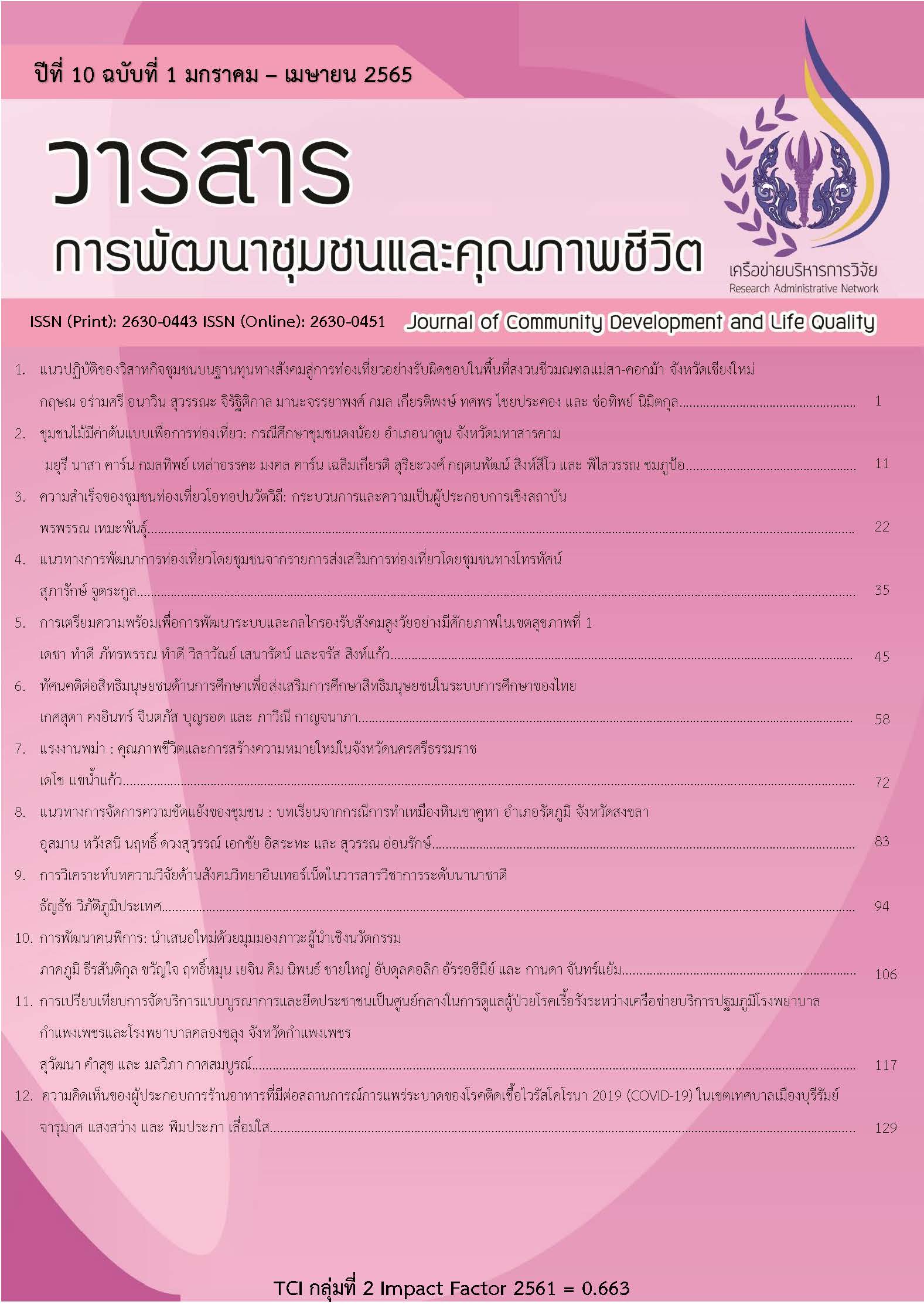ทัศนคติต่อสิทธิมนุษยชนด้านการศึกษาเพื่อส่งเสริมการศึกษาสิทธิมนุษยชน ในระบบการศึกษาของไทย
Main Article Content
บทคัดย่อ
การวิจัยนี้มีวัตถุประสงค์เพื่อศึกษาทัศนคติต่อสิทธิมนุษยชนด้านการศึกษา โดยศึกษากับกลุ่มผู้เรียนและบุคคลทั่วไปรวมจำนวน 404 คน การศึกษาใช้แบบสอบถามออนไลน์ โดยทำการศึกษาทัศนคติต่อสิทธิมนุษยชนด้านการศึกษา 4 ด้าน คือ บทบาทหน้าที่ของครู บทบาทหน้าที่ของครอบครัว บทบาทหน้าที่ของนักเรียน/นักศึกษา และการวางแผนอนาคตของตนเอง ผลการศึกษาพบว่า กลุ่มตัวอย่างแสดงทัศนคติต่อบทบาทหน้าที่ของครูว่า ควรเลิกปลูกฝังว่าคนที่เรียนไม่เก่งเป็นคนล้มเหลวในชีวิต ทัศนคติต่อบทบาทหน้าที่ของครอบครัวว่า พ่อแม่/ผู้ปกครองควรให้ลูกได้เลือกตามแนวทางที่ลูกรักและสนใจ ไม่ใช่ในสิ่งที่ตนสนใจ ทัศนคติต่อบทบาทหน้าที่ของนักเรียน/นักศึกษาว่า การออกมาประท้วงเรียกร้องสิทธิเสรีภาพจากระบบการศึกษาเป็นสิ่งสมควรและทัศนคติต่อการวางแผนอนาคตของตนเองว่า โอกาสที่แตกต่างกันในชีวิตมีผลต่อการเรียนที่ไม่เท่าเทียมกัน ผลการศึกษาวิจัยคาดหวังว่า จะสามารถถูกนำมาใช้เป็นพื้นฐานของการพัฒนาสิทธิมนุษยชนศึกษาทั้งในด้านค่านิยม ทัศนคติ และพฤติกรรม เพื่อส่งเสริมสิทธิมนุษยชนในแนวทางที่สร้างความสงบสุขและการอยู่ร่วมกันอย่างสันติในสังคมสืบไป
Article Details

อนุญาตภายใต้เงื่อนไข Creative Commons Attribution-NonCommercial-NoDerivatives 4.0 International License.
กองบรรณาธิการขอสงวนสิทธิ์ในการตรวจและแก้ไขบทความที่เสนอเพื่อตีพิมพ์ในวารสารการพัฒนาชุมชนและคุณภาพชีวิต
บทความหรือข้อความคิดเห็นใด ๆ ที่ปรากฏในวารสารการพัฒนาชุมชนและคุณภาพชีวิต เป็นวรรณกรรมของผู้เขียนโดยเฉพาะคณะผู้จัดทำไม่จำเป็นต้องเห็นด้วย และไม่ใช่ความรับผิดชอบของมหาวิทยาลัยและคณะผู้จัดทำ / บรรณาธิการ
เอกสารอ้างอิง
Aphornsuvan, T. 2001. The evolution of human rights in Thai intellectual history. Journal of Liberal Arts 1(2): 3-15.
Bagozzi, R.P. 1981. Attitudes, intentions, and behavior: A test of some key hypotheses. Journal of Personality and Social Psychology 41(4): 607-627.
Bajaj, M. 2011. Human rights education: Ideology, location, and approaches. Human Right Quarterly 33: 481-508.
Bunnakh, M. 2012. Statistics for Research and Decision Making. Bangkok: Chulalongkorn University Press. 585 p.
Cargas, S. 2019. Fortifying the future of human rights with human rights education. Journal of Human Rights 18(3): 293-307.
Cargas, S. and G. Mitoma. 2019. Introduction to the special issue on human rights in higher education. Journal of Human Rights 18(3): 275-279.
Cochran, W.G. (1953). Sampling techniques. New York: John Wiley & Sons. Inc. 330 p.
Kanrattanasut, N. and P. Nakurairat, 2018. The synthesis of teaching material development: The case study of the development of teaching material in human trafficking. Roosmile Journal 39(1): 69-82.
Khonthai Foundation. 2014. Thai people monitor 2014: Voices from Thai youth (Youth today). (Online). Available: http://khonthaifoundation.org/wp-content/files/5_Full_version_2557.pdf (September 5, 2021). (in Thai)
Kijrattanakul, T. n.d. Human right education of Thailand. (Online). Available: https://www.constitutionalcourt.or.th/occ_web/ewt_dl_link.php?nid=1489 (September 5, 2021). (in Thai)
Leung, Y. W, and Y. L. Lo. 2012. Are liberal studies teachers ready to prepare human rights respecting students? A portrait of teachers’ attitudes towards human rights. Intercultural Education 23(4): 341-358.
McPherson, J. and K. Libal. 2019. Human rights education in US social work: Is the mandate reaching the field? Journal of Human Rights 18(3): 308-324.
Pimpa, P. 2018. Current Thai studies. Academic Journal of Mahamakut Buddhist University Roi Et Campus 7(1): 242-249.
Rastogi, S. K. 2014. Human rights and its impact on educational and social awareness. International Journal of Innovative Social Science & Humanities Research 1(8): 60-65.
Robeyns, I. 2006. The three models of education: Rights, capabilities and human capital. Theory and Research in Education 4(1): 69-84.
Robinson, C., L. Phillips and A. Quennerstedt. 2018. Human rights education: Developing a theroretical understanding of teachers’ responsibilities. Educational Review 72(2): 220-241.
Selvam, T. 2018. Effects of human rights education among students. Journal of Emerging Technologies and Innovative Research 5(2): 1158-1160.
Simmons, W. P. 2019. Problem-based learning beyond borders: Impact and potential for university-level human rights education. Journal of Human Rights 18(3): 280-292.
Sirota, S. 2019a. Building a case for human rights education. Journal of Human Rights 18(3): 356-362.
Sirota, S. 2019b. From the curriculum to the classroom: The urgent need for preservice human rights teacher education in the United States. Journal of Human Rights 18(3): 325-338.


